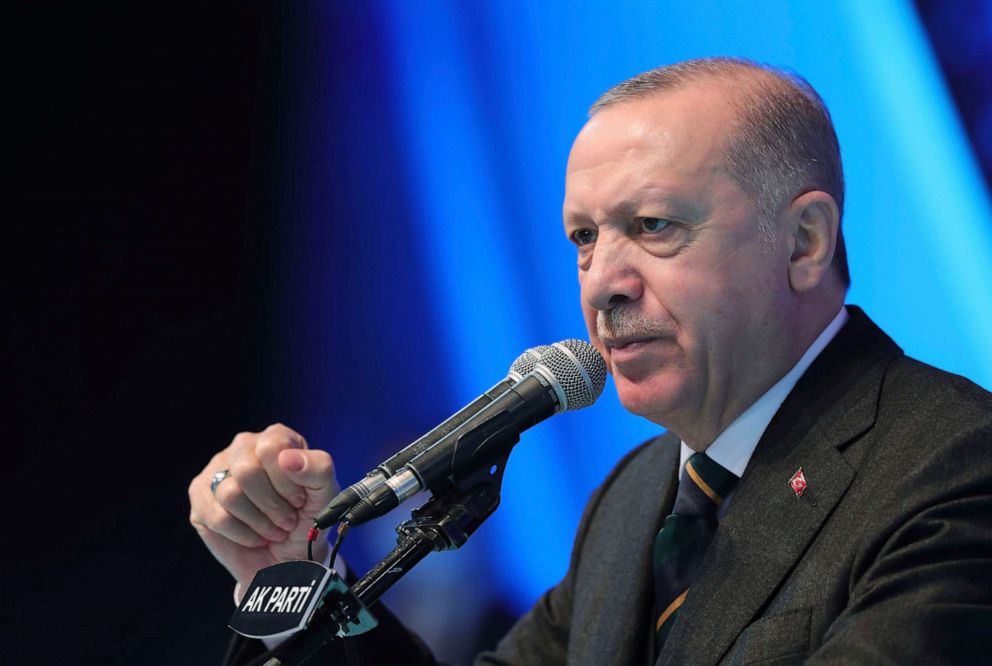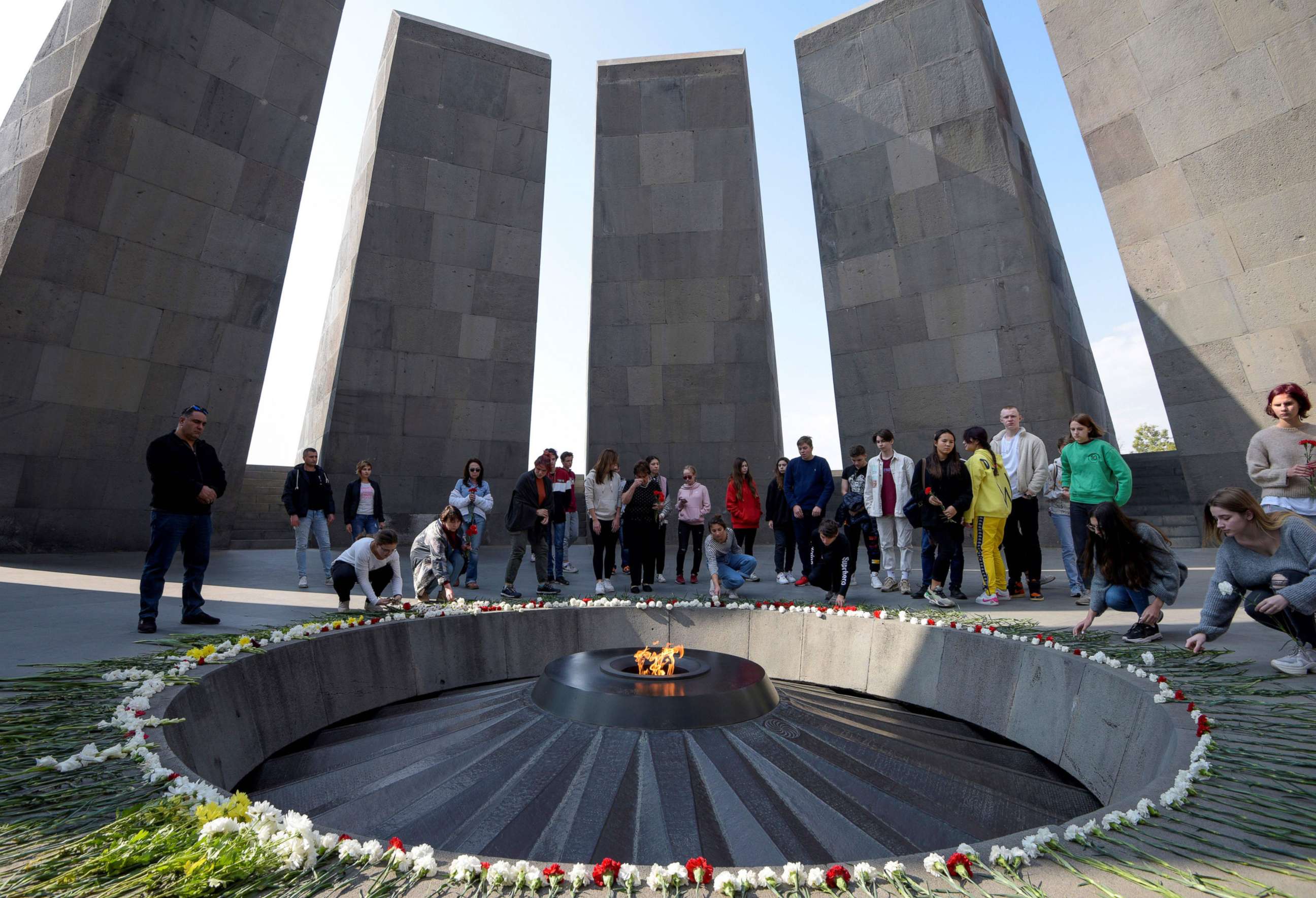Biden makes history by declaring killings of Armenians a 'genocide'
Biden had pledged to recognize the Armenians' treatment as a genocide.
President Joe Biden formally recognized the Ottoman Empire's killing and deportation of Armenians over a century ago as a genocide, breaking from his predecessors and risking inflaming tensions with Turkey.
Biden had pledged as a presidential candidate to recognize the Armenians' treatment, which took place in modern-day Turkey, as genocide. Armenian-Americans have long called on U.S. presidents to do so, but Turkey, a key NATO ally, has warned the U.S. against it, long maintaining that the violence was part of bloody clashes during World War I.
The Turkish government of President Recep Tayyip Erdogan said "we reject and denounce in the strongest terms" Biden's designation, adding it "will open a deep wound that undermines our mutual trust and friendship."

Ties between the two allies have been increasingly strained in recent years, although Biden finally spoke to Erdogan Friday -- their first call during Biden's tenure -- and conveyed "his interest in a constructive bilateral relationship with expanded areas of cooperation and effective management of disagreements."
Biden used the word "genocide" in a statement to mark "Armenian Remembrance Day" on Saturday -- 106 years after the events that the Armenian diaspora considers the start of the genocide. Previous presidents had avoided using the label even as they made the traditional, annual proclamation honoring the anniversary.
"Each year on this day, we remember the lives of all those who died in the Ottoman-era Armenian genocide and recommit ourselves to preventing such an atrocity from ever again occurring," Biden said in the statement. "The American people honor all those Armenians who perished in the genocide that began 106 years ago today," he added.
The statement was expected, especially after then-candidate Biden marked last year's remembrance day by saying, "Silence is complicity."

"If we do not fully acknowledge, commemorate, and teach our children about genocide, the words 'never again' lose their meaning," he wrote, pledging to back a congressional resolution that recognized the Ottoman Empire's actions as genocide. Resolutions to recognize the genocide passed the House and Senate in 2019, but former President Donald Trump, like his predecessors, never joined them.
On Wednesday, over 100 bipartisan members of Congress sent a letter to Biden calling on him to use his proclamation to officially label what happened a "genocide."
The Ottoman Turks deported around 2 million Armenians starting in 1915. Around 1.5 million Armenians are estimated to have been killed.
The Turkish government agrees that fighting during the war killed many, but it has long denied that the treatment of the Christian Armenians by the Muslim Ottomans amounted to genocide and says that the death toll was lower.
Over two-dozen countries have recognized the atrocities as genocide, according to the Armenian National Institute, a Washington-based group that advocates for the genocide designation.
Biden's statement carries no legal implication, and even if the State Department were to follow up with a formal declaration, there are no automatic sanctions or other penalties that kick in. On its final day with former President Donald Trump in office, the Trump administration declared the Chinese government's treatment of Uighurs and other Muslim ethnic minorities as genocide, without implementing sanctions.

But the comments will rattle U.S.-Turkish relations, already on ice over a litany of disagreements, and could damage relations between Biden and Erdogan, who had a warm relationship with Trump. Trump often touted his "friendship" with the strongman president and repeatedly pulled punches against his government until his hand was forced by political pressure, including from congressional Republicans.
His administration sanctioned Turkish government officials and its defense procurement agency in December for the purchase of a Russian missile system -- years after those sanctions were obligated and only after Congress voted to push him a week prior. After seeming to give Erdogan a green light, he also sanctioned senior Turkish officials for their incursion into northern Syria against Kurdish forces that fought alongside U.S. troops against ISIS.
For its part, Turkey's government has long urged the U.S. to hand over Fetullah Gulen, a cleric who has lawful permanent residency in Pennsylvania and whom Erdogan has accused of fomenting a 2016 coup d'état against him. Turkey also views those Syrian Kurdish forces as an existential threat because of their ties to Turkish Kurds that Turkey and the U.S. have designated a terrorist group -- condemning U.S. support as a betrayal.
Little of that tension was expected to improve under Biden, who spoke to Erdogan Friday after what some analysts considered a cold shoulder. The two leaders agreed to meet on the sidelines of a NATO summit in June "to discuss the full range of bilateral and regional issues," the White House said, although it's unclear whether they discussed Biden's genocide comment in advance.




